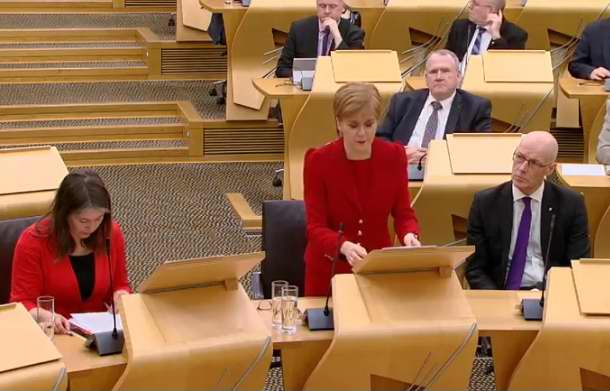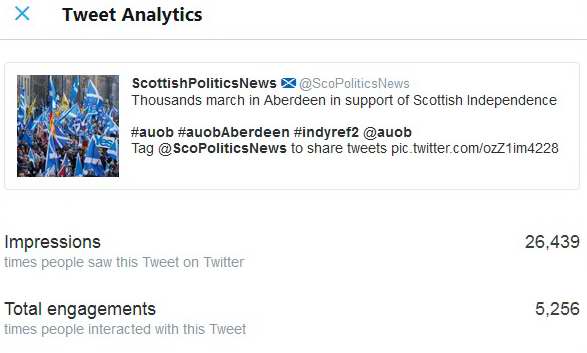Presiding Officer, with your permission, I wish to make a statement on the outcome of last week’s general election.
Let me begin by thanking the returning officers and everybody involved in organising the election.
Their efficiency, integrity and hard work, in this case at short notice, are essential to the smooth conduct of our democracy.
I also congratulate successful candidates, from all parties.
And I commiserate with unsuccessful candidates. As somebody who stood unsuccessfully in two Westminster general elections, I have a good understanding of how they feel.
In addition, it’s worth recognising that this was the first December general election in more than 90 years.
I suspect that the candidates and activists who are still thawing out will hope that it is some time until the next winter election.
However, notwithstanding the challenges of bad weather and dark nights, it is important to note that turnout in Scotland actually increased, a fact that I am sure will be welcomed by all of us.
Presiding officer,
The election was comprehensively won in Scotland by the SNP.
Indeed, you have to go as far back as the election of Ted Heath in 1970 – the year I was born – to find a party that got a higher share of the vote across the UK than the SNP did in Scotland last week.
That is, by any measure, a significant vote of confidence. I and my colleagues will work each and every day to repay the trust that has been placed in us.
It was also an endorsement of our election message – that Scotland does not want a Boris Johnson government and we don’t want to leave the EU; and that, while opinions may differ on the substantive question of independence, we do want Scotland’s future to be in Scotland’s hands.
By contrast, while the Conservative Party won a majority UK wide, they were once again heavily defeated here in Scotland, having fought the election on the single issue of opposition to an independence referendum.
They lost not just vote share, but also more than half of their seats.
In fact, the Conservatives have now lost 17 consecutive Westminster elections in Scotland – stretching back to 1959.

But in spite of that, we face a majority Tory government implementing a manifesto that Scotland rejected.
Furthermore, 74 per cent of votes in Scotland were cast for parties that either supported remaining in the EU or were in favour of a second EU referendum.
90 per cent of seats were won by pro EU or pro EU referendum parties.
But regardless, we are set to be dragged out of the EU against our will.
Presiding Officer, such a democratic deficit is not just undesirable, it is also completely and utterly unsustainable.
The fact is that this election demonstrated a fundamental point.
The kind of future desired by most people in Scotland is very clearly different to that favored by much of the rest of the UK.
It is essential therefore that a future outside of Europe and governed by an increasingly right wing Conservative government is not foisted upon Scotland.
Instead, we must have the right to consider the alternative of independence.
That is why, later this week, in line with repeated election mandates – reinforced once again on Thursday – I will publish the detailed democratic case for a transfer of power from Westminster to this Parliament to allow for an independence referendum that is beyond legal challenge.
This parliament will also vote on the final stage of the Referendums (Scotland) Bill which puts in place the framework for a future referendum.
There are already some signs that those who previously opposed an independence referendum are, when faced with the democratic reality of Thursday’s result, now re-thinking that position.
I welcome that. But let me be clear about this.
I do not assume that an acceptance of Scotland’s right to choose will always equate to support for independence – just as I do not assume that everyone who voted SNP last week is yet ready to vote for independence.
I recognise the work that those of us who support independence still have to do to persuade a clear majority in Scotland that it is the best way forward for our country.
But, nevertheless, it is clear that there is a growing, cross party recognition that election mandates must be honoured, that there has been a material change of circumstances and that the question of independence must be decided by the people and not by politicians.
Given the nature of what we are facing in terms of UK governance, this is now a matter of some urgency – which is why this government wants people to have a choice next year.
Back in the early 1990s, when Scotland was also facing the prospect of a fourth Tory government with no mandate here, there was a coming together of political parties, communities and civic Scotland.
That resulted in the establishment of this Parliament.
It has achieved much.
But a new, Brexit focused Tory government presents risks that few would have predicted at the dawn of devolution.
So I hope in the coming days and weeks we will see a similar coming together around the idea of Scotland’s right to choose a better future.
Of course, we must also re-double our efforts to protect Scotland as best we can with the powers we already have.
This government is determined to do that and I would ask other parties in this chamber to support us in that task.
To cite just one example, the Resolution Foundation last month published research showing that under Conservative plans for social security, child poverty could reach a 60 year high. By 2023, more than one in three children across the UK could be living in poverty. I am sure that no-one in this chamber will find that remotely acceptable.
That means our Child Poverty Action Plan and our work to implement the new Scottish Child Payment will be even more important than it was already.
And of course it now seems inevitable that at the end of January, Scotland will be taken out of the European Union against our will.
Throughout the Brexit process the Westminster government has ignored the wishes of the people of Scotland and the views of this Parliament.
Now it seems the Prime Minister is determined to quickly push through the Withdrawal Agreement Bill.
This Parliament will have to consider whether or not it will give consent to this Bill.
If the UK Government was to press ahead without that consent it would be further proof of Westminster’s contempt for devolution and its willingness to tear up established constitutional rules in its pursuit of Brexit.
The hard, possibly no deal, Brexit favoured by the Prime Minister poses a real danger to our economy and to social and environmental safeguards, at a time when we must substantially step up our efforts to tackle climate change.
Brexit will also put parts of our health service in the sights of US trade negotiators. It could mean, for example, that the NHS has to pay higher prices for drugs.
And of course Brexit is the cause of significant uncertainty and worry for our fellow EU citizens who contribute so much to modern Scotland.
Scotland must respond to and seek to overcome these challenges.
To that end, just as we did in the immediate aftermath of the Brexit vote in 2016, the Scottish government will in January convene a number of round table meetings, bringing together key groups that represent different aspects of Scottish life.
This will include civic society, trade unions and the business community, religious and minority groups and our partners in local government.
We will also engage with the Standing Council on Europe, to ensure that we take whatever steps we can to retain our relationships within Europe and identify ways to ensure our voice and our interests continue to be heard.
And we will listen to the conclusions of the Citizens’ Assembly when it reports in the spring about what kind of country we should be seeking to build.
There is also a particular and immediate challenge that will require cross-party co-operation.
This parliament is required to deliver a budget before the start of the next financial year, and Scotland’s local authorities would expect to set their budgets in late February or early March.
At this point, the UK Government has not confirmed when it will produce its own budget – and with it the block grant adjustments for Scotland – but it may not be until March.
While contingency planning and alternative options have been under consideration for some time, meeting this timetable will require parties to work together.
So in the spirit in which this Parliament was established, and notwithstanding the many disagreements between us, I hope we can find common ground and work together on a range of issues.
Presiding officer,
This is indeed a watershed moment for Scotland.
We are facing a Conservative government that Scotland did not vote for – indeed overwhelmingly rejected – and which many fear will pose a real danger to our country and the fabric of our society.
This parliament has a duty to protect the values that people in Scotland voted for.
I believe we can only fully do that with independence, and that is why later this week I will take the next steps to secure Scotland’s right to choose.
However independence is not an end in itself. It is all about building a fairer and more prosperous country and so we will also do everything we can to achieve that with the powers we have right now.
We must tackle child poverty, protect our NHS and help it overcome the challenges of rising demand; and we must support an open, innovative and export orientated economy.
We must also ensure that Scotland remains an open, welcoming, inclusive country, where people treat each other with kindness, dignity and compassion.
That is not a task for any one party – although as Scotland’s government, my party will take a lead.
But it is a job for us all. My commitment is that I will seek to work with members across the chamber and with civic Scotland as we face the challenges ahead – and as we seek to build the better, fairer and more prosperous Scotland that people voted for.



